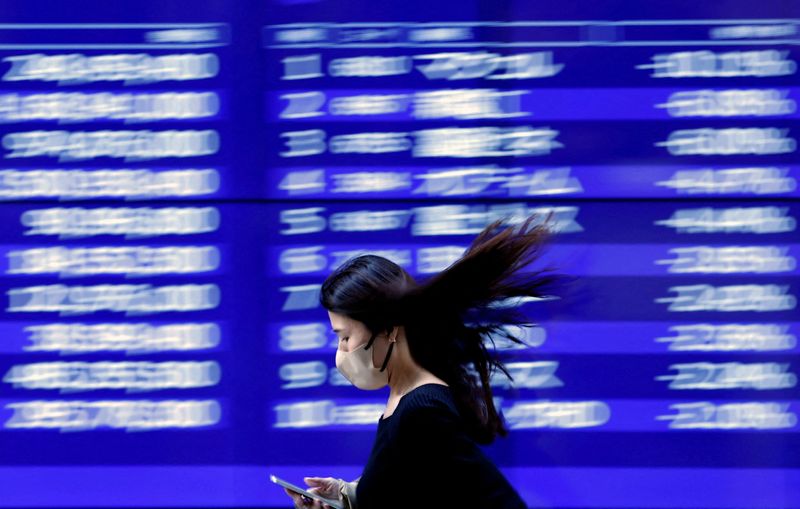By Lawrence Delevingne
(Reuters) -A U.S. tech stock rally and expectations of lower interest rates boosted global shares while the euro and dollar were steady on Wednesday despite political turmoil in South Korea and France.
Wall Street’s major stock indexes rallied to record closing highs, led higher by tech stocks and comments by Federal Reserve officials. Enterprise cloud company Salesforce (NYSE:CRM) and chipmaker Marvell Technology (O:MRVL) logged strong third-quarter results.
UnitedHealth (NYSE:UNH) shares gained nearly 1% despite Brian Thompson, the CEO of its insurance unit, being fatally shot on Wednesday morning in New York City.
The S&P 500 added 0.6% to 6,086 and the Nasdaq Composite jumped 1.3% to 19,735 — both record highs — while the Dow Jones Industrial Average rose 0.7%, to 45,014.
MSCI’s gauge of stocks across the globe (MIWD00000PUS) rose 0.47%.
U.S. Treasury yields fell after Fed Chair Jerome Powell said the recent strength of the economy will allow the U.S. central bank to “be a little more cautious as we try to find neutral” with interest rate policy.
The day started on a more negative note, when lawmakers in South Korea, Asia’s fourth-largest economy, called on President Yoon Suk Yeol to resign or face impeachment a day after he declared martial law, only to reverse the move hours later.
The crisis left South Korea’s benchmark KOSPI index down 1.4%, taking its year-to-date losses to over 7% and making it the worst performing major stock market in Asia this year.
MSCI’s broadest index of Asia-Pacific shares outside Japan, which counts Samsung Electronics (KS:005930) as one of its top constituents, fell 0.15%. Most Asian markets aside from South Korea rose.
The won currency, buoyed by suspected central bank intervention, steadied but remained close to the two-year low against the dollar that it hit late on Tuesday.
South Korea’s finance ministry said it was prepared to deploy unlimited liquidity into financial markets. Reports said the financial regulator was ready to deploy 10 trillion won ($7.1 billion) in a stock market stabilisation fund.
“Martial law itself has been lifted, but this incident creates more uncertainty in the political landscape and the economy,” said ING senior economist Min Joo Kang.
In Europe, stocks gained about 0.4% and the euro traded near a two-year low ahead of the no-confidence vote in France.
French lawmakers later in the day voted to oust the fragile coalition of Prime Minister Michel Barnier, deepening the political crisis in the euro zone’s second-largest economy. Barnier’s government is France’s first to be forced out by a no-confidence vote in more than 60 years. The country is struggling to tame a massive budget deficit.
The single currency, last at $1.0511, was little changed on the day but down about 5% over the last three months. Investors have been bracing for tariffs from U.S. President-elect Donald Trump.
U.S. POLICY PATH
Away from political turmoil, investors are hoping for more clues on the policy path the Fed will likely take next year, with a November employment report due on Friday.
U.S. job openings increased solidly in October while layoffs dropped by the most in 1-1/2 years, data showed on Tuesday. Another survey showed employers hesitant to hire more workers.
U.S. economic activity also expanded slightly in most regions since early October, with employment growth “subdued” and inflation rising at a modest pace and businesses expressing optimism about the future, the Fed said on Wednesday in its “Beige Book” economic summary.
The yield on benchmark U.S. 10-year notes fell 3.3 basis points to 4.188%, from 4.221% late on Tuesday.
St. Louis Fed President Alberto Musalem said the pace of future rate cuts has grown less clear.
The BlackRock (NYSE:BLK) Investment Institute (BII) said it sees persistent U.S. inflationary pressures from rising geopolitical fragmentation, big spending on AI and low-carbon transition. In debt markets, BII raised its weighting on short-term U.S. Treasuries to “neutral” from “underweight”, saying market pricing now roughly matches its expectations for interest rate cuts from the Fed next year.
“We think it will cut further in 2025, and growth will cool a little, but with inflation still above target the Fed won’t have room to cut much past 4%, leaving rates well above pre-pandemic levels,” BII said in its 2025 outlook.
Markets see about a 75% chance of a 25 basis point cut this month, with 80 bps of cuts expected by the end of next year.
In currencies, the dollar index, which measures the U.S. currency against six rivals, was little changed at 106.3.
Oil futures slipped as traders awaited an imminent OPEC+ decision on supply. A larger-than-expected draw in U.S. crude stockpiles last week lent some support to prices.
U.S. crude fell 1.62% to $68.81 a barrel and Brent declined to $72.53 per barrel, down 1.48% on the day. [O/R]
In cryptocurrencies, bitcoin gained 3% to $98,892 and Ethereum rose 7.4% to $3,881 as Trump said he would nominate Paul Atkins to run the U.S. Securities and Exchange Commission. Atkins is seen as a crypto industry-friendly pick.

